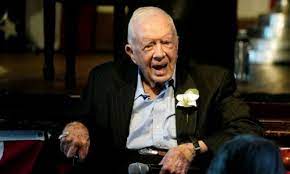NEW YORK (Reuters): Former US President Jimmy Carter will end medical treatment and enter hospice care at his Georgia home, his foundation announced on Saturday.
The Carter Center said Mr Carter had decided to “spend his remaining time at home with his family,” but did not say what had prompted the decision.
Mr Carter, 98, has suffered from recent health issues, including a melanoma that spread to his liver and brain.
The country’s oldest living leader, he served one term in office from 1977-81. During his tenure as president Mr Carter faced a spate of foreign policy challenges and the Democrat was defeated in his re-election bid by Ronald Reagan.
“He has the full support of his family and his medical team. The Carter family asks for privacy during this time and is grateful for the concern shown by his many admirers,” the Carter Center said in a statement on Saturday. Terminally ill patients may seek hospice care instead of going through further medical treatment. The priority is not to provide further treatment, but to provide comfort towards the end of a patient’s life. Mr Carter’s grandson, Jason Carter, a former Georgia state senator, tweeted that he visited “both of my grandparents yesterday.” “They are at peace and – as always – their home is full of love. Thank you all for your kind words,” he said. In 2021, Mr Carter and his wife Roslyn celebrated their 75th wedding anniversary. They have four children together.
Born in Georgia in 1924, Mr Carter entered politics in the 1960s when he was elected as state senator, before becoming the state’s governor in 1971.
Five years later he defeated the sitting Republican President Gerald Ford to become the 39th commander-in-chief.
But problems quickly mounted for Mr Carter as president. At home, an oil crisis produced high inflation and unemployment, and he struggled to persuade Americans to accept the required austerity measures. The high-point of the Carter years was the signing of the Camp David Accords in 1978 in which Egypt formally recognised the state of Israel. He also signed a treaty returning control of the Panama Canal to Panama.
But in 1979 the last Shah of Iran was overthrown and 66 Americans were taken hostage in Tehran in the aftermath. Mr Carter cut off diplomatic relations with Iran in response and introduced a trade embargo.
However, the public did not believe he was being tough enough and his popularity slumped as the US hostages were held for 444 days. His approval ratings took a further hit after an attempt to rescue the hostages failed and eight US military members were killed. Iran then delayed the release of the hostages until after Ronald Reagan was sworn in.







